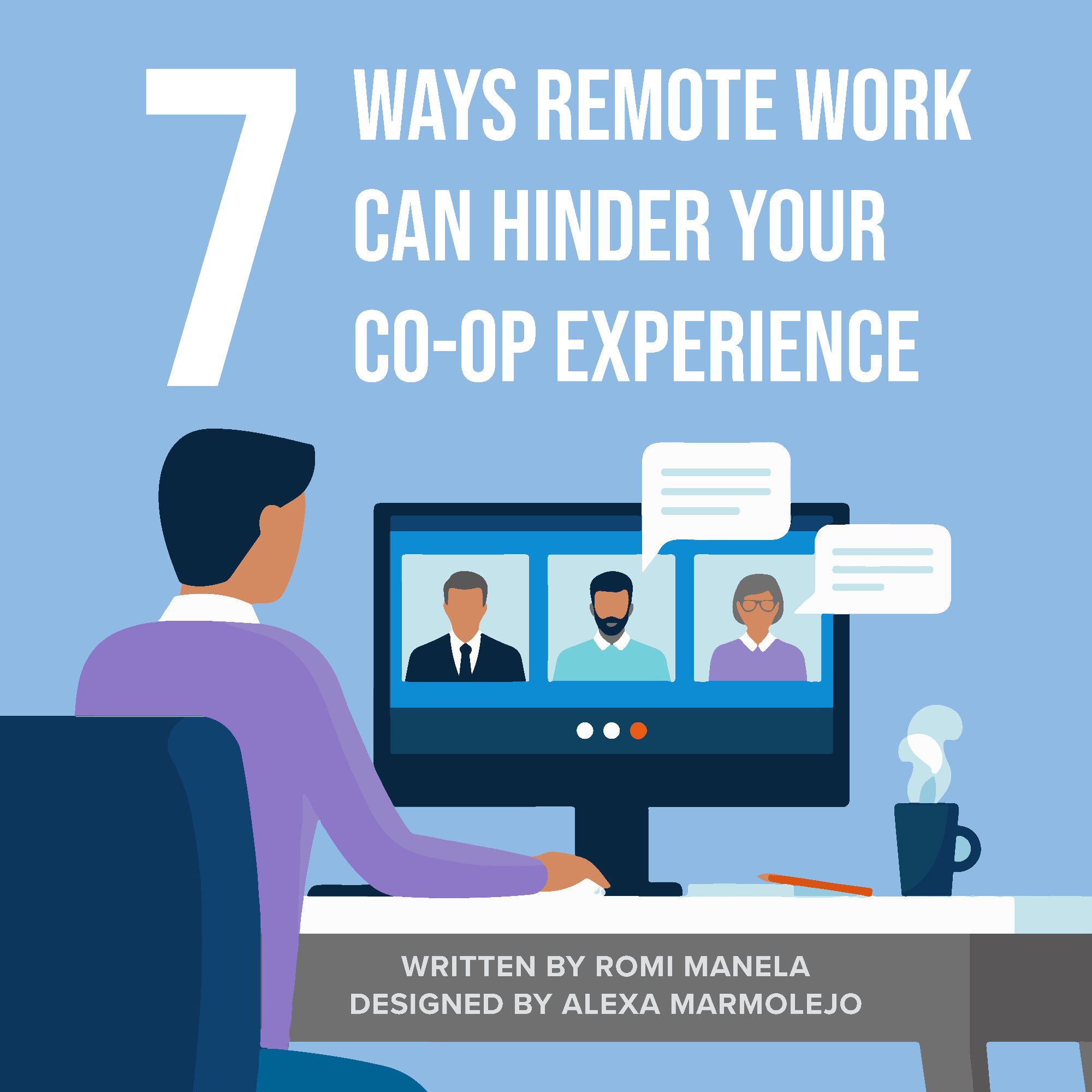
Remote work is in many ways the new normal. Hybrid and remote work options have become increasingly common since the COVID-19 pandemic forced many offices to function online, and the remote structure is now preferred by many. A survey performed by Slack, a workplace communication platform, found that 72% of 9,000 workers from six countries prefer a hybrid remote-office model with only 12% preferring to work in an office setting five days a week. They also found that 13% would prefer to permanently work from home if given the choice. Offering remote or hybrid options has become important for employers to stay competitive in the job market and increase employee retention. Productivity may also improve at home. A study performed by Stanford University found work performance was boosted by 22% when employees worked from home. Remote work also saves on the cost of office space and time costs of commuting.
At Northeastern, co-ops with remote and hybrid options are common, particularly in fields that don’t require hands-on tasks, such as software engineering or social media marketing. Amid all the benefits, remote work may seem like the clear future of office work, so what might be some of the drawbacks?
Anyone who has spent all day on Zoom meetings or alone at home hunched over a computer screen knows that remote work is not always an improvement over the in-person experience. There’s no denying that it’s nice to sleep in and do work from your couch, but there may be downsides to this convenience. Despite the benefits, here are seven challenges you may face in a remote co-op:
- Building relationships and trust through social interaction
Socializing over Zoom meetings is just not the same as being in person. Research shows that the minor delay in audio and visual cues on Zoom meetings can negatively affect our interpersonal perceptions. This can contribute to “Zoom fatigue,” a term coined to describe the burnout workers feel when overusing virtual platforms. Remote workers are also less likely to engage in spontaneous conversations that occur naturally in an in-person environment, making it harder for remote co-ops to build trusting relationships with their coworkers.
- Networking, career advancement and mentorship
In addition to social relationships, remote work may also pose challenges to co-ops hoping to network and advance within their company. A primary benefit of the co-op system is the opportunity to build a network in your anticipated career path in college. Remote workers in a hybrid setting might suffer from the effects of proximity bias, where managers in office settings may have a tendency to reward employees they physically interact with more. Low visibility of a remote worker may also impact their ability to network organically with their office superiors and form valuable mentorships.
- Blurred work/life balance
At home, it can be harder to separate your work life and home life. In a survey of remote workers conducted in 2022 by PR Newswire, 47% of the workers surveyed reported concern with blurred boundaries between their job and personal life. For some remote workers, this lack of clear boundaries between work and home life can fuel stress and burnout.
- Sedentary lifestyle
This one might be a bit of a stretch seeing as a daily commute isn’t typically physically strenuous, but working in person does give you a reason to get up and out of the house in the morning. With no reason to leave the house in the morning, fully remote co-ops might find themselves being more sedentary than they otherwise would be while in classes. This can be remedied with an intentional incorporation of daily movement, such as stretching or daily walk breaks, into your routine as a remote worker.
- Loneliness and mental health issues
Working from home can be lonely. Particularly for workers whose jobs require a high level of independent work, a remote co-op may go hours without any human interaction. While data on the effects of remote work and its impacts on mental health are mixed and report both negative and positive effects on mental health, the rise of work-from-home policies may contribute to increased feelings of loneliness in remote workers. However, some research shows that proper support from coworkers and supervisors can help combat these feelings.
- Technical issues
Lastly, remote work may cause technical issues that impede your workday. If your computer is broken, you can’t just turn to a coworker for help, or walk downstairs to get a replacement from technical support. Beyond that, Wi-Fi and connection issues can sabotage your ability to communicate effectively. You may realize a certain task requires equipment that is only found at the office. An unforeseen technical difficulty (that can’t easily be solved at home) could derail your whole day.
I am generally a fan of remote work. It allows more flexibility in my schedule, saves commute time and grants me autonomy over my work environment. Remote work is also not a monolith; your experience with it may depend on a variety of factors, including the culture and structure of the company. Consider this: Is the job entirely remote, hybrid-optional or hybrid with required in-person days? How does the company culture treat remote workers? These are important questions to ask when determining the state of remote work within a specific organization.
However, with experiential learning being a cornerstone of the Northeastern experience, it is important to think about what value might be lost in remote working. Choosing a co-op that offers some level of in-person involvement may lead you to a more meaningful co-op experience in the long run. In reality, there’s no such thing as a perfect work environment; everyone has their unique preferences. The key, whether you’re searching for a co-op or a full-time position — find a balance that works for you.